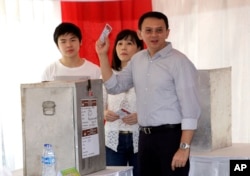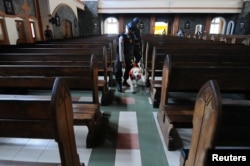The former Chinese Christian governor of Jakarta got an unusual Christmas present: a 15-day reduction on his two-year prison term. Basuki “Ahok” Tjahaja Purnama was imprisoned in May for blasphemy for allegedly insulting the Quran while campaigning in Jakarta’s gubernatorial election. He lost the election in April and was sentenced shortly afterward.
His sentence was slightly commuted, along with 9,000 other Christian prisoners in Indonesia, as part of a policy that rewards inmates for good conduct on Indonesian independence day and major religious holidays. Those who have served at least six months in jail are eligible for sentence reductions. It’s reportedly a cost-saving measure for the country’s overcrowded jails.
Ahok’s Christmas present was the biggest piece of news from the holiday week in the world’s largest Muslim country, which was peaceful overall despite some unrest in the days leading up to the Christian holiday.
Indonesia typically increases security measures in December in case of unrest or terror attacks; this year it deployed 180,000 security personnel, an increase from last year’s 150,000. Heightened security is in place until January 3, according to the Home Affairs Ministry, and includes preparing 24-hour community health clinics and hospitals.
President Joko “Jokowi” Widodo posted a Christmas greeting on Twitter, writing, “To all Christians in Indonesia, I wish you a Merry Christmas. The country’s religious diversity is a blessing for us all.” The heads of the national police and the Indonesian military also visited Jakarta Cathedral at its midnight Christmas mass.
Minor unrest
The only major Christmas-related protest took place in Aceh, an ultraconservative province in Western Indonesia ruled by sharia law. On December 20, militant Islamists protested at the capital of Banda Aceh against Christmas and New Year’s Eve celebrations, in hopes of prompting a fatwa against those holidays from the local clerics.
“There are no Christmas signs at all there this year,” said Andreas Harsono, an Indonesia researcher with Human Rights Watch. “It is more repressive than in previous years.”
There are about 50,000 Christians in Aceh, but they have kept their celebrations quiet in recent years. Nine churches in the province were demolished in 2016 because of building code violations.
Bakery wars
Another controversy came from the port city of Makassar, in South Sulawesi, when a bakery refused to make a “Merry Christmas” cake for a longtime customer, citing religious principles.
The Chocolicious bakery offered an apology on social media, writing, “It’s not that we do not appreciate anyone’s religion. But with all due respect this is how we must act based on the principles of our religion. Once again we apologize with most sincere hearts and mutual respect as fellow Indonesians.”
The incident, an interesting parallel to bakery-related culture clash in the U.S., elicited a critical op-ed from the Jakarta Post, and a mix of approving and disapproving commentary from Indonesian citizens.
Interfaith initiatives
Although Indonesia is often depicted as being on the verge of sectarian breakdown, the pendulum of tolerance typically swings back following periods of unrest, like that of the Jakarta election. Since then, the government has cracked down on hard-line Islamist groups and the Constitutional Court has made some progressive rulings, including one on religious tolerance that allows citizens to list indigenous faiths on their national ID cards.
This year, as in previous years, members of Nahdlatul Ulama, the Indonesian Sunni group that is the world’s largest Muslim organization, guarded churches on Christmas in what has become an annual interfaith tradition. Ansor, NU’s youth “militia” wing, mobilized 2 million members across Indonesia, said Yaqut Cholil Qoumas, chairman of Ansor.
“Ansor did this because of the belief that taking care of the church is the same as taking care of Indonesia,” Qoumas said. “Ansor realized [decades ago] that Indonesia could not be independent without the struggle of people of all religions, including Christians. In Indonesia’s history, many heroes have been Christian. … Now, as the majority, in Ansor’s opinion, Muslims must protect the minority in their worship. … Maintaining diversity is Indonesia’s strength.”
“This year’s Christmas celebrations were no different from those of recent years,” said Bonar Tigor Naipospos of the Setara Institute, a religious affairs think tank. “Safe and orderly.”






